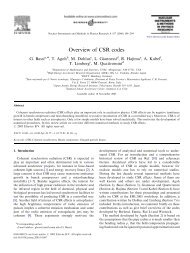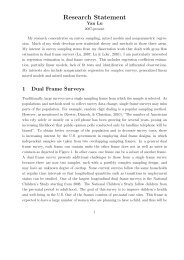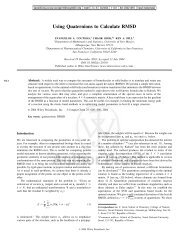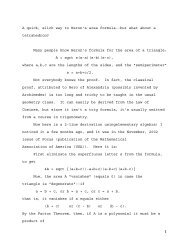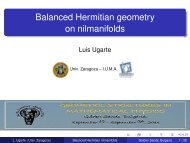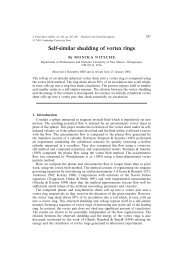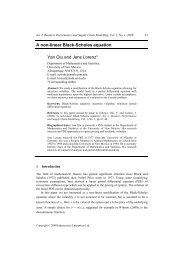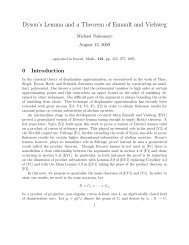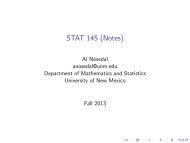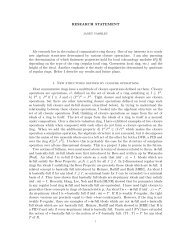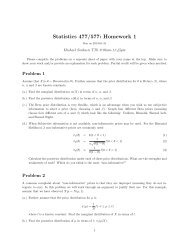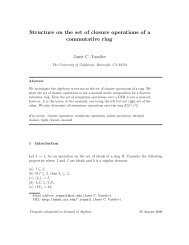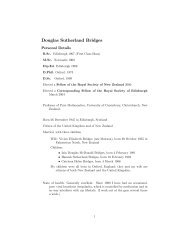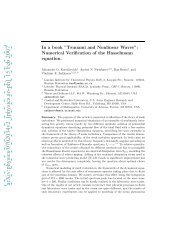OEO Office of Equal Opportunity - Department of Mathematics and ...
OEO Office of Equal Opportunity - Department of Mathematics and ...
OEO Office of Equal Opportunity - Department of Mathematics and ...
Create successful ePaper yourself
Turn your PDF publications into a flip-book with our unique Google optimized e-Paper software.
238 ARTS AND SCIENCES<br />
Degrees Offered<br />
M.A. in Linguistics<br />
The <strong>Department</strong> <strong>of</strong> Linguistics <strong>of</strong>fers the Master <strong>of</strong> Arts<br />
degree in linguistics with flexibility in selection <strong>of</strong> an area<br />
<strong>of</strong> study. This degree is <strong>of</strong>fered under Plan I (24 hours plus<br />
thesis) or Plan II (32 hours) according to the regulations set<br />
forth in earlier pages <strong>of</strong> this catalog, except that a minimum<br />
<strong>of</strong> 12 hours <strong>of</strong> 500-level courses is required.<br />
Minimum prerequisites for pursuing the M.A. in linguistics are<br />
18 hours <strong>of</strong> basic linguistics, including introductory linguistic<br />
analysis, phonetics, phonological analysis, grammatical analysis,<br />
introductory sociolinguistics <strong>and</strong> introductory psycholinguistics.<br />
Deficiencies in these prerequisites may be made up<br />
after admission to the program but such course work may not<br />
be counted toward the degree.<br />
C<strong>and</strong>idates for the master’s degree must complete 18 hours<br />
<strong>of</strong> core course work, including one course in each <strong>of</strong> the<br />
following areas: phonology (502, 503), syntax (523), semantics<br />
<strong>and</strong> discourse (525, 529), psycholinguistics (560, 563,<br />
565, 566, 568, 569L), sociolinguistics (533, 535, 539) <strong>and</strong><br />
language change (546). The remaining required hours are<br />
selected by the c<strong>and</strong>idate, with the approval <strong>of</strong> the Graduate<br />
Advisor.<br />
Computational Linguistics<br />
In addition to the course work for the Linguistics M.A., the<br />
concentration in Computational Linguistics requires five<br />
prerequisite Computer Science courses, three recommended<br />
graduate-level Computer Science courses plus two additional<br />
electives or two plus nine thesis hours. One <strong>of</strong> three<br />
Master’s examination questions must address an area <strong>of</strong><br />
Computational Linguistics.<br />
Native American Languages <strong>of</strong> the<br />
Southwest<br />
The <strong>Department</strong> <strong>of</strong> Linguistics <strong>of</strong>fers the M.A. in Linguistics<br />
with an Emphasis in Native American Languages <strong>of</strong> the<br />
Southwest. The program is designed so as to take advantage<br />
<strong>of</strong> the resources in the <strong>Department</strong>s <strong>of</strong> Linguistics,<br />
Native American Studies, <strong>and</strong> Anthropology, as well as the<br />
College <strong>of</strong> Education. The emphasis on Native American<br />
Languages is designed to fit with the department’s interest in<br />
functional grammar <strong>and</strong> sociolinguistics. C<strong>and</strong>idates for the<br />
M.A. degree under the thesis Plan I must complete 24 hours<br />
<strong>of</strong> course work in linguistics plus at least eight thesis hours<br />
<strong>and</strong> c<strong>and</strong>idates under the non-thesis Plan II must complete<br />
32 hours <strong>of</strong> course work in linguistics. The c<strong>and</strong>idate will<br />
choose one <strong>of</strong> three focus areas: 1) field research on Native<br />
American languages, 2) issues in bilingual education, or<br />
3) Navajo studies. Four courses in the chosen focus area,<br />
<strong>and</strong> one course from either <strong>of</strong> the other two focus areas,<br />
are required.<br />
Ph.D. in Linguistics<br />
Admission to the Ph.D. program is highly selective. The following<br />
criteria must be met: 1) completion <strong>of</strong> course work<br />
equivalent to the University <strong>of</strong> New Mexico M.A. in Linguistics<br />
with an average <strong>of</strong> B+ or better; 2) Pass with Distinction on<br />
the University <strong>of</strong> New Mexico M.A. Comprehensive Exam or<br />
the submission <strong>of</strong> a research paper <strong>of</strong> publishable quality;<br />
<strong>and</strong> 3) willingness <strong>of</strong> a University <strong>of</strong> New Mexico Linguistics<br />
faculty member to serve as the student’s mentor.<br />
The Ph.D. program requires a minimum <strong>of</strong> 48 graduate credit<br />
hours including at least 18 hours <strong>of</strong> coursework beyond the<br />
M.A. Required courses are: 1) a total <strong>of</strong> two <strong>of</strong> the following<br />
phonetics <strong>and</strong> phonology courses – 502, 503, 505; 2) syntax<br />
– 523; 3) a total <strong>of</strong> two <strong>of</strong> the following four courses – 524,<br />
529, 548, or a seminar on cognitive grammar (currently<br />
<strong>of</strong>fered as Ling. 554); 4) at least one methods course; <strong>and</strong> 5)<br />
three advanced seminars in the areas <strong>of</strong> preparation for the<br />
comprehensive examination. These required courses include<br />
some that were required for the MA <strong>and</strong> courses taken for<br />
that degree may be included as fulfilling the requirements for<br />
the Ph.D. as well.<br />
Research skills required for the Ph.D. are 1) reading, writing,<br />
<strong>and</strong> conversational ability in a language other than the<br />
student’s native language (this requirement may be fulfilled<br />
by 4 semesters <strong>of</strong> college language courses with a grade<br />
<strong>of</strong> B or better); 2) knowledge <strong>of</strong> the structure <strong>of</strong> a non-Indo-<br />
European language; <strong>and</strong> 3) coursework in statistics up to <strong>and</strong><br />
including analysis <strong>of</strong> variance or the equivalent.<br />
At the end <strong>of</strong> their coursework Ph.D. c<strong>and</strong>idates are required<br />
to take a comprehensive examination over three areas <strong>of</strong><br />
specialization.<br />
Please contact the department for more detailed information<br />
on admissions <strong>and</strong> requirements for the M.A. <strong>and</strong><br />
Ph.D. programs or consult the Web site, http://www.unm.<br />
edu/~linguist.<br />
Computational Linguistics<br />
The Ph.D. Major in Linguistics with a concentration in<br />
Computational Linguistics requires that the student complete<br />
a minimum <strong>of</strong> 48 hours <strong>of</strong> graduate credit course work that<br />
includes up to 30 hours <strong>of</strong> appropriate courses from the M.A.,<br />
but at least 18 hours must be course work beyond the M.A.<br />
At least 24 hours must be completed at UNM <strong>and</strong> at least<br />
18 hours must be at the 500 or 600 level. Students must<br />
fulfill the following requirements: 1) One 500-level course<br />
each in phonology, grammar <strong>and</strong> discourse, <strong>and</strong> computer<br />
science beyond what is required for the M.A.; 2) at least one<br />
methods course (which may include an appropriate course<br />
from Computer Science); 3) three advanced seminars in the<br />
areas <strong>of</strong> preparation for the comprehensive examination; 4)<br />
a comprehensive examination over three areas <strong>of</strong> specialization,<br />
two <strong>of</strong> which shall be in the core areas <strong>of</strong> linguistics,<br />
<strong>and</strong> one in the area <strong>of</strong> computational linguistics; 5) reading,<br />
writing, <strong>and</strong> conversational ability in a language other than<br />
the student’s native language plus pr<strong>of</strong>iciency in a computer<br />
language; 6) knowledge <strong>of</strong> the structure <strong>of</strong> a non-Indo-<br />
European language; <strong>and</strong> 7) course work in formal modeling<br />
or quantitative methods.<br />
Speech <strong>and</strong> Hearing Sciences<br />
The <strong>Department</strong> <strong>of</strong>fers a concentration in the linguistics<br />
doctoral program for students interested in combining the<br />
study <strong>of</strong> Speech <strong>and</strong> Hearing Sciences with Linguistics.<br />
Requirements for students who have a master’s degree<br />
in Speech-Language Pathology are: LING 504; LING 522;<br />
LING 531; LING 567; LING 502 or 503; LING 523; LING 532,<br />
533, or 535. Requirements for students who have a master’s<br />
degree in Linguistics: SHS 510; LING 506; SHS 431; SHS<br />
550; SHS 507; SHS 530 or LING 560; one additional SHS<br />
course on disorders. Requirements for all students in the concentration:<br />
a second graduate course in phonetics <strong>and</strong> phonology<br />
(chosen from LING 502, 503, or 505); LING 529; <strong>and</strong><br />
the following (specific courses must be approved by the comprehensive<br />
examination committee): a graduate level course<br />
in statistics; a graduate level course in research methods (not<br />
SHS 506); three seminars, one in each <strong>of</strong> the comprehensive<br />
examination areas. Students in the concentration must also<br />
meet all other requirements for the Linguistics Ph.D.<br />
Linguistics (LING)<br />
101. Introduction to the Study <strong>of</strong> Language. (3)<br />
(Also <strong>of</strong>fered as ANTH 110.) Broad overview <strong>of</strong> the nature <strong>of</strong><br />
language: language structure, biology <strong>of</strong> language, language<br />
learning, language <strong>and</strong> thought, bilingualism, social <strong>and</strong><br />
regional variation <strong>and</strong> educational implications. Intended to<br />
UNM CATALOG 2006–2007 Symbols, page 611.



